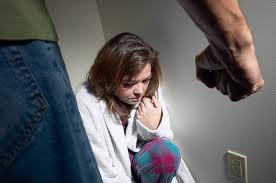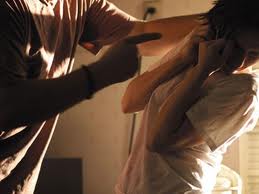Domestic Violence
Penal Code Section 273.5 States:
“(a) Any person who willfully inflicts upon a person who is his or her spouse, former spouse, cohabitant, former cohabitant, or the mother or father of his or her child, corporal injury resulting in a traumatic condition, is guilty of a felony, and upon conviction thereof shall be punished by imprisonment in the state prison for two, three, or four years, or in a county jail for not more than one year, or by a fine of up to six thousand dollars ($6,000) or by both that fine and imprisonment.
(b) Holding oneself out to be the husband or wife of the person with whom one is cohabiting is not necessary to constitute cohabitation as the term is used in this section.
(c) As used in this section, “traumatic condition” means a condition of the body, such as a wound or external or internal injury, whether of a minor or serious nature, caused by a physical force.
(d) For the purpose of this section, a person shall be considered the father or mother of another person’s child if the alleged male parent is presumed the natural father under Sections 7611 and 7612 of the Family Code.
(e)(1) Any person convicted of violating this section for acts occurring within seven years of a previous conviction under subdivision (a), or subdivision (d) of Section 243, or Section 243.4, 244, 244.5, or 245, shall be punished by imprisonment in a county jail for not more than one year, or by imprisonment in the state prison for two, four, or five years, or by both imprisonment and a fine of up to ten thousand dollars ($10,000).
(2) Any person convicted of a violation of this section for acts occurring within seven years of a previous conviction under subdivision (e) of Section 243 shall be punished by imprisonment in the state prison for two, three, or four years, or in a county jail for not more than one year, or by a fine of up to ten thousand dollars ($10,000), or by both that imprisonment and fine.
(f) If probation is granted to any person convicted under subdivision (a), the court shall impose probation consistent with the provisions of Section 1203.097.
(g) If probation is granted, or the execution or imposition of a sentence is suspended, for any defendant convicted under subdivision (a) who has been convicted of any prior offense specified in subdivision (e), the court shall impose one of the following conditions of probation:
(1) If the defendant has suffered one prior conviction within the previous seven years for a violation of any offense specified in subdivision (e), it shall be a condition thereof, in addition to the provisions contained in Section 1203.097, that he or she be imprisoned in a county jail for not less than 15 days.
(2) If the defendant has suffered two or more prior convictions within the previous seven years for a violation of any offense specified in subdivision (e), it shall be a condition of probation, in addition to the provisions contained in Section 1203.097, that he or she be imprisoned in a county jail for not less than 60 days.
(3) The court, upon a showing of good cause, may find that the mandatory imprisonment required by this subdivision shall not be imposed and shall state on the record its reasons for finding good cause.
(h) If probation is granted upon conviction of a violation of subdivision (a), the conditions of probation may include, consistent with the terms of probation imposed pursuant to Section 1203.097, in lieu of a fine, one or both of the following requirements:
(1) That the defendant make payments to a battered women’s shelter, up to a maximum of five thousand dollars ($5,000), pursuant to Section 1203.097.
(2) That the defendant reimburse the victim for reasonable costs of counseling and other reasonable expenses that the court finds are the direct result of the defendant’s offense.
For any order to pay a fine, make payments to a battered women’s shelter, or pay restitution as a condition of probation under this subdivision, the court shall make a determination of the defendant’s ability to pay. In no event shall any order to make payments to a battered women’s shelter be made if it would impair the ability of the defendant to pay direct restitution to the victim or court-ordered child support. Where the injury to a married person is caused in whole or in part by the criminal acts of his or her spouse in violation of this section, the community property may not be used to discharge the liability of the offending spouse for restitution to the injured spouse, required by Section 1203.04, as operative on or before August 2, 1995, or Section 1202.4, or to a shelter for costs with regard to the injured spouse and dependents, required by this section, until all separate property of the offending spouse is exhausted.
(i) Upon conviction under subdivision (a), the sentencing court shall also consider issuing an order restraining the defendant from any contact with the victim, which may be valid for up to 10 years, as determined by the court. It is the intent of the Legislature that the length of any restraining order be based upon the seriousness of the facts before the court, the probability of future violations, and the safety of the victim and his or her immediate family. This protective order may be issued by the court whether the defendant is sentenced to state prison, county jail, or if imposition of sentence is suspended and the defendant is placed on probation.”
DV occurs where people currently live or previously lived together, or are family members or sexual partners, and one person threatens, inflicts another person with physical or sexual harm, emotionally harasses, or violates their personal sense of space or peace, or destroys that person’s personal property.
Domestic violence (DV) exists in any relationship. DV abuse can include:
- Verbal or written abuse
- Any kind of physical violence
- Coerced or forced sexual behavior or acts
- Psychological or emotional abuse
- Harassing someone in person, over the phone, through the Internet, or even US Mail.
Domestic Violence: What the Prosecutor Must Prove Beyond a Reasonable Doubt
Jury Instruction 840. Inflicting Injury on Spouse, Cohabitant, or Fellow Parent Resulting in Traumatic Condition
The defendant is charged [in Count ] with inflicting an injury on [his/her] ([former] spouse/[former] cohabitant/the (mother/father) of (his/her) child) that resulted in a traumatic condition [in violation of Penal Code section 273.5(a)].
To prove that the defendant is guilty of this crime, the People must prove that:
1. The defendant willfully [and unlawfully] inflicted a physical injury on [his/her] ([former] spouse/[former] cohabitant/the (mother/father) of (his/her) child);
[AND]
2. The injury inflicted by the defendant resulted in a traumatic condition.
<Give element 3 when instructing on self-defense or defense of another>
[AND]
3. The defendant did not act (in self-defense/ [or] in defense of someone else).]
Someone commits an act willfully when he or she does it willingly or on purpose.
A traumatic condition is a wound or other bodily injury, whether minor or serious, caused by the direct application of physical force.
[The term cohabitants means two unrelated persons living together for a substantial period of time, resulting in some permanency of the relationship. Factors that may determine whether people are cohabiting include, but are not limited to, (1) sexual relations between the parties while sharing the same residence, (2) sharing of income or expenses, (3) joint use or ownership of property, (4) the parties’ holding themselves out as (husband and wife/domestic partners), (5) the continuity of the relationship, and (6) the length of the relationship.]
[A person may cohabit simultaneously with two or more people at different locations, during the same time frame, if he or she maintains substantial ongoing relationships with each person and lives with each person for significant periods.]
[A person is considered to be the (mother/father) of another person’s child if the alleged male parent is presumed under law to be the natural father. <insert name of presumed father> is presumed under law to be the natural father of <insert name of child>.]
[A traumatic condition is the result of an injury if:
1. The traumatic condition was the natural and probable consequence of the injury;
2. The injury was a direct and substantial factor in causing the condition;
[AND]
3. The condition would not have happened without the injury.
A natural and probable consequence is one that a reasonable person would know is likely to happen if nothing unusual intervenes. In deciding whether a consequence is natural and probable, consider all of the circumstances established by the evidence.
A substantial factor is more than a trivial or remote factor. However, it does not need to be the only factor that resulted in the traumatic condition.]
Legally, the definition of domestic violence is very broad.
Even if you don’t consider an act “domestic violence,” it may fall within the purview of DV under the current status of the law. If you willfully inflict any injury, no matter how minor, upon the body of an intimate partner, you can be charged with a felony. If convicted, you will face prison time and heavy fines.
If you or someone you know has been charged with Domestic Violence, contact John J. Stanley & Associates at (818) 769-5200 for your free consultation.


